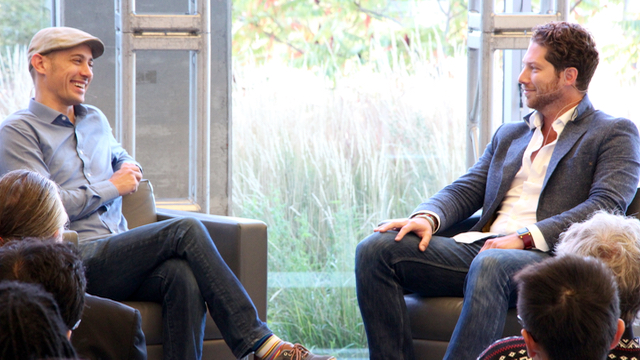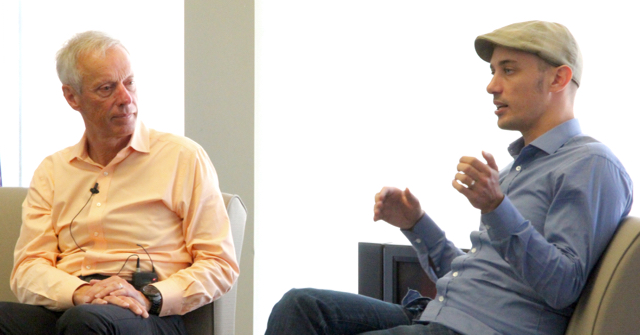The business world has changed and there's no going back.
If anyone is living proof of this statement, it's Tobias Lütke, CEO of Shopify, the Ottawa-based e-commerce juggernaut that announced a major expansion of its Waterloo Region operations on Thursday. Plans call for a 300-employee office in the former Seagram Museum/CIGI building in Waterloo's core to open in April 2016.
Lütke, that rare tech CEO who combines programmer and philosopher in equal measure, shared this and other pieces of wisdom during a day-long string of appearances in Waterloo Region, culminating in a sold-out evening event at the Tannery Event Centre.
Business, Lütke said, continues to follow the Henry Ford industrial model, to its peril. In continuing to build his ever-more-popular platform for online retailers, the German-born 35-year-old is determined to transcend that path and avoid the embarrassment that he believes will accompany historical examinations of the present 30 years from now.
"The only thing we can do is be ready for change," he told his audience of 250, many of them aspiring entrepreneurs themselves, as he declared the once-mandatory five-year business plan dead and buried.
The day was dotted with similarly incisive statements as Lütke, whose company is currently valued at $C2.8 billion, made his way from the University of Waterloo, to Wilfrid Laurier University, to the company's future Waterloo office, to the Communitech Hub.
Shopify's new Waterloo location, to be occupied in April 2016, will enable a tenfold increase in its local footprint, which currently counts 30 employees at a sales lab that opened about a year ago in the Lang Tannery, where Communitech, Google, D2L and other tech firms are located.
Not surprisingly, Lütke was warmly welcomed at his first stop, the University of Waterloo, where he was interviewed onstage by Michael Litt, CEO of Vidyard, a video marketing and analytics firm that's among the region's hottest homegrown companies.

Shopify CEO Tobi Lütke (left) chats with Vidyard CEO Michael Litt at the
University of Waterloo on Thursday, Oct. 1, 2015.
(Communitech photo: Phil Froklage)
"We’ve hired a lot of co-op students who have just been incredible and immediately become a part of the team as soon as they join," Lütke said of the university's formidable talent pipeline. "So why Waterloo? Why not? It was like, 'What took us so long, really?'"
Lütke provoked a big round of laughs – and further endeared himself to his audience – when he spoke of the region's growing reputation in Silicon Valley: ". . . I used to go to the Valley a lot, to get financing and things like this. People would say to me: 'It must be so great to be in Canada because you’re like, next to Waterloo.'"
Of Canada in general, Lütke said we're "an amazing place to build the kind of companies we’re building. There’s enormous loyalty, hard work, an incredibly deep talent pool, and plain optimism. I don’t think you can build a company like Shopify or Vidyard or anything else with a pessimistic crowd."
Later in the day, at the University of Waterloo Velocity Garage in the Tannery, Lütke hosted an impromptu ask-me-anything session with budding entrepreneurs in a quiet corner of the startup incubator.
He replied thoughtfully to a broad spectrum of questions from the audience, much of it made up of young students of the type Shopify will be looking to hire at its Waterloo facility.
A sampling:
- "If there would have been a Shopify or a Shopify-quality product in 2004 when I started my [online] snowboard store, I would have never started building this company, and it would have been OK."
- "You really need diversity. You need diversity across degrees, backgrounds, genders, ethnicities. Any diversity you can get in your business is good."
- "When I hire people and work with them closely, I have this weird kind of thing I talk with them about, which I call the 'trust battery.' You meet someone, and then you trust them about 50 per cent, because you have not a lot to go on. Then you interact with them, and maybe you have positive experiences when you work together and they do something really well, and then it sort of slowly charges; it might go up to 60 per cent, 70 per cent, 80 per cent, 90 per cent. Something magical happens at around 80 to 90 per cent, where the need for communication actually starts reducing significantly."
- "For the first six years of Shopify’s history, my finance department was, like, two Ruby scripts I wrote."
- "I don’t travel a lot. I actually have no status with any airline. I think I might be the first person to take a company public who has no status with any airline. I’ve been home every weekend for the last 140 weeks. I’m counting, and it’s a good streak."
- "I’m really, really happy that politicians are talking about startups," Lütke said of the NDP's reversal of its proposal to tax stock options, which cash-starved startups use to attract vital talent. "I think they got themselves into this problem out of a position of some ignorance about the good part of this tax break. The more politicians have to change their plans because startups exist, the better."
- "Building companies is one of the hardest things you’ll ever do. It’s completely unnatural. It’s an enormous amount of pressure, an enormous amount of skills that you are required to have to see this through. And there’s also the roller-coaster of your own emotions."
- "I’ve absolutely spent days where I’ve felt I was unbeatable or dead three times before breakfast. It goes that fast."
- "I had to go to my father-in-law, who was not a rich man, to ask him if he could give me a cheque for payroll for about nine months. I also lived in his house, to cut costs. I don’t recommend that. That was a bit tough."
With close to 1,000 employees split among Ottawa, Montreal, Toronto and Waterloo Region, Shopify has become Canada’s hottest technology company, with a market capitalization more than twice its value at the time of its initial public offering just over four months ago.
The company's e-commerce platform, launched as Shopify in 2006, now counts more than 175,000 business customers, and has facilitated $10 billion in online purchases. The company's expansion in Waterloo is to accommodate growth of Shopify Plus, its offering for high-volume merchants and large enterprises.
It will be hiring in Waterloo Region for a diverse array of positions, including sales, engineering, design, account management, training and human resources, among others.

Steve Farlow, Executive Director of Wilfrid Laurier University’s
Schlegel Centre for Entrepreneurship, looks on as
Shopify CEO Tobi Lütke makes a point.
(Communitech photo: Phil Froklage)
Shopify's new Waterloo location sits in the heart of the city at Erb and Caroline streets, in a renovated, yellow-brick barrelhouse that was once part of the original Seagram Distillery, which closed in 1992. The building operated as the Seagram Museum from 1984 to 1997, and won the Governor General’s Medal in Architecture in 1986. Three other buildings at the same intersection – the Perimeter Institute for Theoretical Physics, the Canadian Clay and Glass Gallery and the Balsillie School of International Affairs – have won the same prestigious honour.
Software company Waterloo Maple occupied the former museum from 1998 to 2003, when the Centre for International Governance Innovation, founded by former BlackBerry co-CEO Jim Balsillie, moved in. In 2014, CIGI's operations moved into the adjacent CIGI Campus that houses the Balsillie School, leaving the building available for lease.
As Lütke's evening talk wound down, he paid respect to the Waterloo ecosystem, and characterized it as an example for the country.
"We always knew that Waterloo was one area where we don’t have to be convinced that it’s exciting," he said. "I love how much this area is all in on creating startups. I think that’s absolutely the future, and I would love to pick everyone’s brain about how to roll that out to the rest of Canada."
He finished with a nod to entrepreneurial passion, and an embrace of uncertainty:
"If I had to leave Shopify right now for whatever reason, I would just start the same company again . . . This is such a large challenge . . . It’s going to be so interesting – that’s the only thing I can guarantee."
(with files from Phil Froklage, Communitech News)

